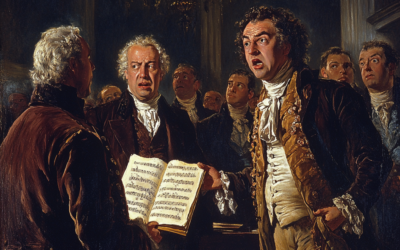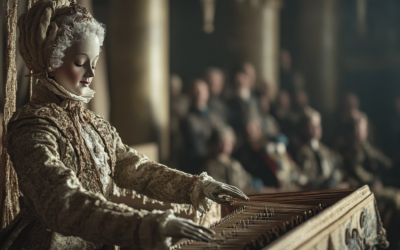The Return of Gatti's Aria
Our Revision Takes the Stage in Munich
In the magnificent Max Joseph Hall of the Residenz München, tenor Daniel Behle performed the aria “Puoi vantar le tue ritorte” by Luigi Gatti, taken from his opera Nitteti. This concertante piece, for which we composed the cadenzas, was brought to life by the Salzburger Hofmusik orchestra under the direction of Wolfgang Brunner.
Mozart: The Fall of the Gods
This book offers a fresh and critical look at the life of Wolfgang Amadeus Mozart, challenging the myths that have surrounded him for centuries. We strip away the romanticised image of the “natural genius” and delve into the contradictions within Mozart’s extensive biographies. Backed by nearly 2,000 meticulously sourced citations, this work invites readers to explore a deeper, more complex understanding of Mozart. Perfect for those who wish to question the traditional narrative, this biography is a must-read for serious music lovers and historians.
"It’s a pleasure to breathe new life into such a powerful, yet overlooked piece of music."
@MozartrazoM
We first introduced this virtuosic and spectacular music in its modern premiere in Bayreuth, where it was met with great enthusiasm. Given its success, we were thrilled to see it performed again in Munich.
Earlier this year, on 24th April, we had the opportunity to discuss this work in detail during our lecture at Bocconi University, explaining the intricate revisions we made to Gatti’s original composition. This marks another exciting milestone in reviving forgotten gems of 18th-century music and bringing them to modern audiences.
You May Also Like
When the Myth Collapsed
Vienna exposed the myth: La Finta semplice was riddled with errors, and Wolfgang’s supposed opera genius was nothing more than Leopold’s fabrication. With their reputation in ruins, father and son turned to Italy, hoping to rewrite history.
The London Notebook and the Vienna Disaster
Far from the myth of a flawless young genius, Mozart’s London Notebook reveals musical struggles and guided exercises, while the Vienna opera disaster proved that his father played a far greater role in his compositions than legend would have us believe.
Versailles, Vanity, and the Pursuit of Prestige
Leopold Mozart’s letters transformed his son’s European tour into a carefully staged fantasy—filled with exaggerated encounters, fabricated royal admiration, and a relentless pursuit of social prestige. But how much of it was real?
The Fabricated Childhood of Mozart
The legend of young Mozart’s divine genius crumbles under scrutiny, revealing a childhood dictated by Leopold’s ambition, carefully constructed myths, and a relentless pursuit of fame at the expense of genuine artistic education.
The Man Behind the Myth
Leopold Mozart’s legacy has been shaped by myths and hagiographies, but his letters reveal a man more concerned with financial gain and self-promotion than artistic integrity. Was he truly a devoted father, or simply an opportunist?
Constanze vs. The Catholic Church
For over two centuries, scholars have debated the circumstances surrounding Mozart’s burial. Constanze Mozart’s supposed inability to mark his grave, the confrontation with the Catholic Church over funeral masses, and the baffling disappearance of Mozart’s body all contribute to a mystery stranger than fiction. Did a powerful group keep her silent? And what really happened to Mozart’s remains?







